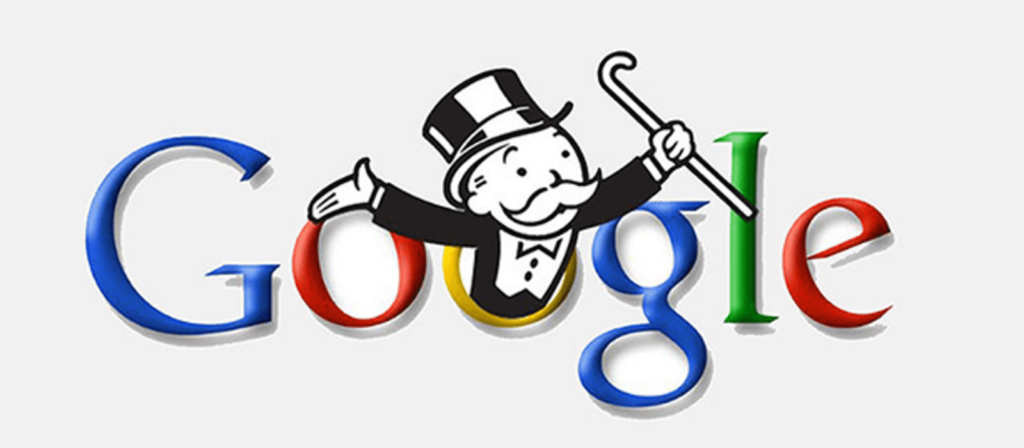Last week on July 29, 2020, the CEOs of the most powerful tech companies in the world—including Google, Facebook, Amazon, and Apple—were called in to testify in front of the House Antitrust Subcommittee. The event was widely considered to be mostly political theater, a performance act for Congress to look like they’re hard on Big Tech. But the tech titans took it seriously, knowing the one thing that actually determines whether antitrust legislation moves forward: how each company fares in the court of public opinion. The company taking the most heat from both Democrats and Republicans was, without a doubt, Google. They’re also the company that’s most likely to be regulated.
The antitrust case against Google is the most straightforward of any of the big tech companies. Google started out as an almost benevolent index of the world wide web, showing users ten blue, unbiased links for whatever users were searching for. But over the years, Google has steadily favored showing their own products above organic search results, even when their own products arguably aren’t as good. Rand Fishkin says that in 2020, Google has gone “from everyone’s search engine to everyone’s competitor.”
As the founder of an SEO company, RankScience, and as someone who’s been working in growth and digital marketing for more than a decade, I’ve had a front-row seat to watch Google devour screen real estate to feature its own products. From my point of view, Google is squeezing businesses more than ever and the game is increasingly rigged in Google’s favor. Small and local businesses have almost no chance at succeeding with SEO because they don’t have the budget or resources for it. To make things worse, so much screen real estate is now taken up by Google’s own products, small businesses have no choice but to pay Google for search traffic. Even if users are searching directly for a business’s name, Google controls the appearance and experience of interacting with that business.
Local restaurants, for example, are forced to use Google’s partner ChowNow in order to have convenient “Order Pickup” or “Order Delivery” buttons in search results for their own name, which charges an added hefty fee to the restaurant for each order, hurting their already thin margins. During the global pandemic, this is an incredibly predatory shakedown. No small business should be forced to use Google’s preferred ordering mechanism, and pay a tax to Google, simply to allow a customer to search for their business.

Ben Thompson of Stratechery wrote a great post summarizing the antitrust issues each tech behemoth has, yet highlights his issues with Google’s position: “Google’s anticompetitive behavior is relatively clear…the company consistently favors its own properties in search results, particularly ‘above-the-fold’…that is, results that are not actually search results but which seek to answer the user’s query directly.” A few examples:

Take a look below at how Google-owned YouTube results take up the vast majority of the screen on a simple video search. Other competing video products like Vimeo or Twitch don’t get the same visual treatment or preference in search results. You can barely see the first organic search result for this query:

The problem gets even worse when we’re talking about more lucrative search categories, like flight search or finding a hotel. On the flight search example below (which also includes a Covid-19 travel warning), Google Ads and Google’s own Flights product take up the entire screen, any organic search results pushed below the fold. When searching for “hotels near cape may, nj” the actual organic search results were almost two pages below the fold. How many users do you think scroll that far, instead of clicking on Google’s products?


Yelp, TripAdvisor, and other companies have been complaining about unfair treatment by Google for years, but left unfettered, Google is only going to continue to expand their own products into more search categories over time. The list of companies with grievances against Google is growing. The landscape for businesses to compete in search is increasingly competitive, and the companies who succeed in search over the long-run are using advanced tactics like SEO A/B testing and NLP content optimization, which the average business can’t afford.
On a recent episode of the All-In Podcast, Jason Calacanis, Chamath Palihapitiya, and esteemed guests engage in a rigorous and detailed debate about Big Tech antitrust and censorship (I recommend giving it a listen if you haven’t, as it covers the strongest arguments both for and against Big Tech regulation). Chamath says what I think most people don’t want to admit:
The internet is now a pervasive and critical part of human infrastructure. As such, there needs to be people that regulate and manage the internet—the same way that the FAA manages and regulates planes, and wind turbines, etc.… Let’s take aviation [for example], it’s impossible for you to go into your garage and build a plane that takes people from point A to point B. Take agriculture [for example], it’s impossible for you to build up a farm and supply it to Safeway, without any checks and balances.
There are very specific kinds of businesses and business models that should be overseen. The first and most important thing is a body [that] oversees the collection of user data and privacy and identification. The second one is essentially something that tears the fig leaf off of internet companies and says, you know what, you are the equivalent of a publisher and a platform, some weird hybrid that we didn’t think could exist when we wrote these rules, so we’re now going to adapt these rules. If you think about it, nobody is happy with the internet publishers today. The left thinks that it skews right, the right thinks it skews left—everybody is confused. Nobody gets what they want and somebody has to step in.
You go to a movie and it tells you who can go to the movie or not. You buy an album and it tells you whether there’s explicit lyrics or not. Before you turn on the TV, there’s some rating agency that tells you whether your kid should be watching with you. My point is: what is the equivalent version here? We all need to think about what it is, but for there to be nothing is crazy.
Google search is fundamentally the gateway to the internet for the majority of people and an arbiter of truth in our digital age. Google has a dominant market monopoly position, a treasure trove of sensitive information on hundreds of millions of users. It’s incentivized to return value to shareholders and extract more value from search over time, which is at odds with doing right by businesses and citizens. Their business model doesn’t require them to act in the long-term interest of businesses and citizens, and because they have a monopoly on a utility that’s become essential to our day-to-day lives, the only solution is for the government to enforce guidelines on fair behavior within search.
Related Posts
- How Coderwall grew SEO traffic by 57% with a single SEO A/B test
- How eCommerce sites are using SEO A/B testing to boost sales

Get Data-Driven about growing your traffic with RankScience.





